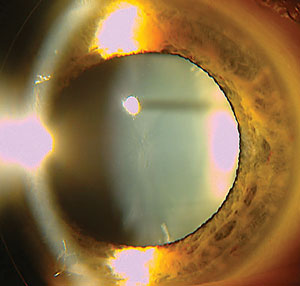 |
| This study reported that the incidence of mental health disorders in children with cataract was nearly double that of controls. Photo: Marc D. Myers, OD. Click image to enlarge. |
Children and adolescents who suffer from chronic diseases are at increased risk for mental health disorders, according to mounting clinical and research evidence. Those with type 1 diabetes, for example, have increased risk for anxiety, mood problems and eating disorders. Researchers in Denmark noted that childhood cataract presents a significant visual disability in infancy and early childhood, and removal of visually disturbing cataracts usually requires prolonged, intensive rehabilitation.
“Childhood cataract can occur isolated or can be seen in combination with somatic comorbidities that may be associated with neurodevelopmental disorders,” they noted. “Most cases of childhood cataract occur early in childhood, which is also the period of onset of several childhood mental disorders, in particular neurodevelopmental disorders.” They added that children with cataract are more likely to come from a socioeconomically disadvantaged background which may further increase the risk of pediatric mental disorders.
To evaluate the incidence of mental disorders among children with cataract, researchers conducted a nationwide cohort study from comprehensive national databases. The study was conducted in a hospital setting. The researchers analyzed incidences of mental disorders reported between 2000 and 2017 in children diagnosed with cataract before age 10 (n=485). They compared this cohort with a sex- and age-matched control group (n=4,358). They took into account somatic diseases in the child and parental socioeconomic status and psychiatric morbidity.
The investigators reported that the incidence of mental disorders in children with cataract was nearly double that of controls (OR: 1.83). Anxiety disorders were four times as high in children with cataract (OR: 4.10) and their risk of developmental delay was doubled (OR: 2.66). The researchers also noted, “The risk of mental disorders was significantly higher in children diagnosed with cataract in the first three years of life compared with controls (OR: 2.36); whereas, those diagnosed with cataract later in childhood didn’t have an increased risk (OR: 1.24).”
Additionally, children who underwent cataract removal surgery demonstrated greater prevalence of mental disorders; however, the researchers were unsure whether this was due to the surgery itself, the visual impairment or the pathology of the cataract.
The researchers stated that neurodevelopmental disorders in children with cataract were expected, but they were surprised by the fourfold risk of anxiety disorders. They say this finding is in line with studies on other chronic diseases in childhood such as epilepsy and type 1 diabetes. They noted that there are only a few studies on mental health problems associated with childhood cataract.
“Children with cataract are exposed to repeated examinations under anesthesia and hospital appointments, at-home patching therapy for amblyopia and they may suffer from visual impairment associated with cataract, which influences social interactions, e.g., response to facial expressions,” they explained. “Importantly, our incidence of anxiety disorders may be underestimated, as anxiety often presents during adolescence and we only included children up to the age of 10 years.”
They concluded that their nationally representative sample indicated a “markedly higher incidence of developmental disorders and anxiety among children with cataract compared with the background pediatric population.” Even after adjusting for factors such as disease cofounders or parental socioeconomic status and psychiatric disease, the researchers say that the associations between cataract and mental disorders remained significant. “Increased awareness of the mental health burden associated with childhood cataract is important,” they said. They advise routine screening for mental health to help guide and support mental health and quality of life.
Al-Bakri M, Skovgaard AM, Bach-Holm D, et al. Increased incidence of mental disorders in children with cataract—findings from a population-based study. Am J Ophthalmol. October 11, 2021. [Epub ahead of print]. |

